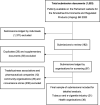Use of supporting evidence by health and industry organisations in the consultation on e-cigarette regulations in New Zealand
- PMID: 36174037
- PMCID: PMC9522304
- DOI: 10.1371/journal.pone.0275053
Use of supporting evidence by health and industry organisations in the consultation on e-cigarette regulations in New Zealand
Abstract
Objectives: Scientific evidence to support the development of appropriate policy for electronic cigarette use is limited by rapidly changing technology and a lack of long-term data. Perceptions of risk and benefits determine diverse framings of the e-cigarette debate and complicate policy decisions. E-cigarette use by smokers who are attempting to quit may result in improved health outcomes, while their use among young people and non-smokers may lead to adverse health consequences. The purpose of this study was to identify the types of evidence used during public consultations on proposed revisions to New Zealand's e-cigarette legislation in 2020.
Methods: Using submissions to parliament made by the tobacco/e-cigarette industry and the health sector, we assessed the cited evidence for quality and independence measured by publication type and tobacco industry connections. We identified themes from a sub-sample of frequently cited evidence to understand how stakeholders and organisations used evidence.
Results: The sample consisted of 57 submissions from the e-cigarette and tobacco industry (n = 21) and health organisations (n = 36). A total of 442 pieces of evidence were cited at least once. Health organisations were more likely to cite peer-reviewed evidence (OR = 2.99). The industry was more likely to cite evidence outside of peer review and sources with tobacco industry connections (OR = 4.08). In the sample of frequently cited evidence, youth prevalence and flavours were the most common themes. In some cases the same evidence was used by both groups to support opposing policy positions.
Conclusions: The industry continues to rely more heavily on evidence published outside of the peer-review process, which is, therefore, subjected to less scientific scrutiny. By using a smoking-cessation or harm-reduction narrative, the industry could be seen as a legitimate stakeholder in policy development.
Conflict of interest statement
The authors have declared that no competing interests exist.
Similar articles
-
An analysis of e-cigarette policy action, inaction and industry influence: implications for youth uptake in New Zealand.Perspect Public Health. 2025 Mar;145(2):105-112. doi: 10.1177/17579139251322009. Epub 2025 Mar 18. Perspect Public Health. 2025. PMID: 40099849 Free PMC article.
-
An analysis of key stakeholder policy perspectives in the proposed e-cigarette regulations in New Zealand.Health Promot J Austr. 2023 Oct;34(4):875-882. doi: 10.1002/hpja.709. Epub 2023 Mar 8. Health Promot J Austr. 2023. PMID: 36843364
-
A thematic analysis of tobacco industry responses to the Scottish Government's consultation on e-cigarette regulation.Health Promot Int. 2024 Dec 1;39(6):daae145. doi: 10.1093/heapro/daae145. Health Promot Int. 2024. PMID: 39569475 Free PMC article.
-
Public Health Policies on E-Cigarettes.Curr Cardiol Rep. 2019 Aug 28;21(10):111. doi: 10.1007/s11886-019-1204-y. Curr Cardiol Rep. 2019. PMID: 31463564 Free PMC article. Review.
-
Financial Conflicts of Interest and Stance on Tobacco Harm Reduction: A Systematic Review.Am J Public Health. 2019 Jul;109(7):e1-e8. doi: 10.2105/AJPH.2019.305106. Epub 2019 May 16. Am J Public Health. 2019. PMID: 31095414 Free PMC article.
Cited by
-
Trends in smoking prevalence among 14-15-year-old adolescents before and after the emergence of vaping in New Zealand; an interrupted time series analysis of repeated cross-sectional data, 1999-2023.Lancet Reg Health West Pac. 2025 Mar 20;56:101522. doi: 10.1016/j.lanwpc.2025.101522. eCollection 2025 Mar. Lancet Reg Health West Pac. 2025. PMID: 40226779 Free PMC article.
-
E-Cigarette Retailers' Use of Instagram in New Zealand: A Content Analysis.Int J Environ Res Public Health. 2023 Jan 19;20(3):1897. doi: 10.3390/ijerph20031897. Int J Environ Res Public Health. 2023. PMID: 36767263 Free PMC article.
-
An analysis of e-cigarette policy action, inaction and industry influence: implications for youth uptake in New Zealand.Perspect Public Health. 2025 Mar;145(2):105-112. doi: 10.1177/17579139251322009. Epub 2025 Mar 18. Perspect Public Health. 2025. PMID: 40099849 Free PMC article.
References
-
- Parkhurst J. The Politics of Evidence: From evidence -based policy to the good governance of evidence. Taylor & Francis; 2017. Available: https://library.oapen.org/handle/20.500.12657/31002
-
- Erku DA, Kisely S, Morphett K, Steadman KJ, Gartner CE. Framing and scientific uncertainty in nicotine vaping product regulation: An examination of competing narratives among health and medical organisations in the UK, Australia and New Zealand. Int J Drug Policy. 2020;78: 102699. doi: 10.1016/j.drugpo.2020.102699 - DOI - PubMed
-
- Erku DA, Morphett K, Steadman KJ, Gartner CE. Policy Debates Regarding Nicotine Vaping Products in Australia: A Qualitative Analysis of Submissions to a Government Inquiry from Health and Medical Organisations. Int J Environ Res Public Health. 2019;16: 4555. doi: 10.3390/ijerph16224555 - DOI - PMC - PubMed
-
- Hawkins B, Ettelt S. The strategic uses of evidence in UK e-cigarettes policy debates. Evid Policy J Res Debate Pract. 2018;15: 579–596.
MeSH terms
LinkOut - more resources
Full Text Sources
Medical


